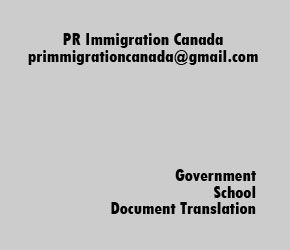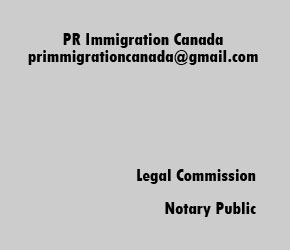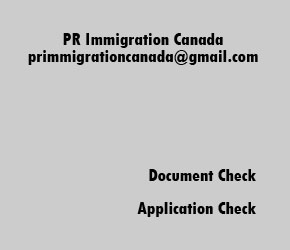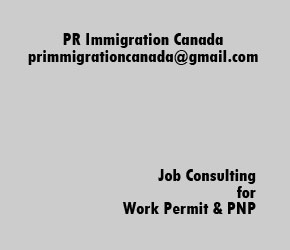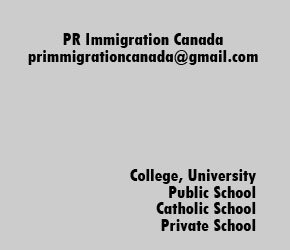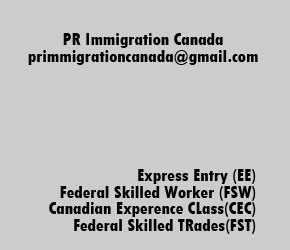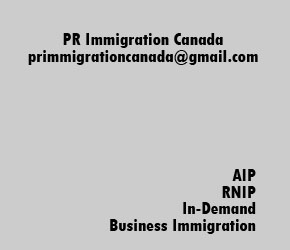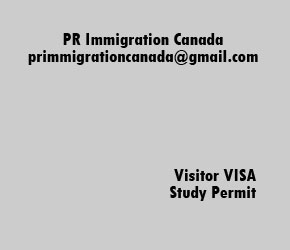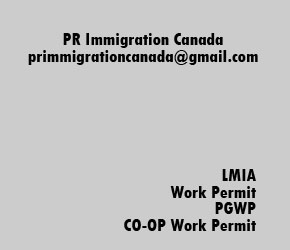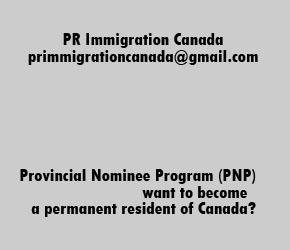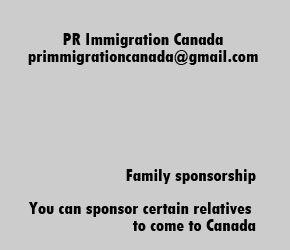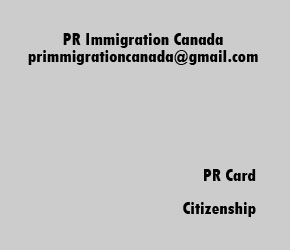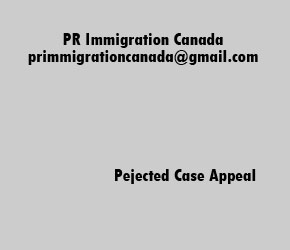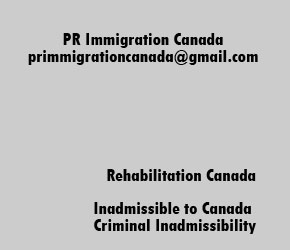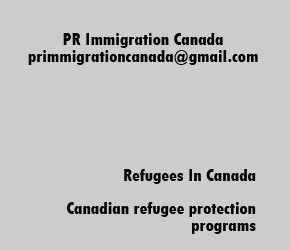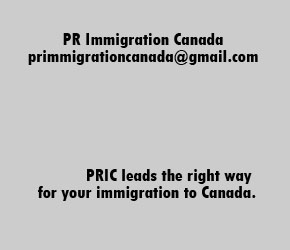Visitor VISA, Study Permit
Visitor VISA
Canada is a popular tourist destination. Many people come to Canada to enjoy their vacation or to visit their family member(s) or friends.
Study Permit
Public School, Catholic School, Private School, College, University
As you study in Canadian education system, you also learn about, well, Canada! You will have opportunities to work and apply for Permanent Residence.
LMIA, Work Permit, PGWP, Co-op Work Permit
Temporary Foreign Workers Program requires a positive Labour Market Impact Assessment (LMIA). Once foreign worker gets the positive LMIA, he/she can apply the Work Permit. The student who graduated a Canadian college/University (Eligible Canadian designated learning institutions) can get a Post-Graduation Work Permit (PGWP). A Co-op Work Permit allows students to work full-time during regular academic terms.
Express Entry (EE)
Federal Skilled Worker (FSW), Canadian Experience Class (CEC), Federal Skilled Trades (FST)
Canada is always looking for skills – they help make Canada great. For the CEC through Express Entry, you must have at least 12 months of skilled work experience in Canada, in the last three years. The Federal Skilled Trades Program is for people who want to become permanent residents based on being qualified in a skilled trade.
Provincial Nominee Program (PNP)
Provinces and territories in Canada are, well, very big. Each province has their unique markets in Canadian economy and demand for appropriate skills that can help the province. They can also be a way for you to become a permanent resident of Canada.
Family Sponsorship
Spouse, Dependent Children, Parents and Grand Parents
Family unification is as important to Government of Canada as much as you feel about it. There are three (3) types of relationship defined for partner in partner sponsorship.
PR Card, Citizenship, Appeal, Rehabilitation, Notary Public, Translation
PR Card Renew
Citizenship requirements are physical presence, language and knowledge.
Reject Case Appeal - You can appeal against any rejected result from Canadian immigration office.
You can apply for Rehabilitation if you were convicted of a crime outside Canada and your sentence ended at least five years ago.
Translation
Notary Public
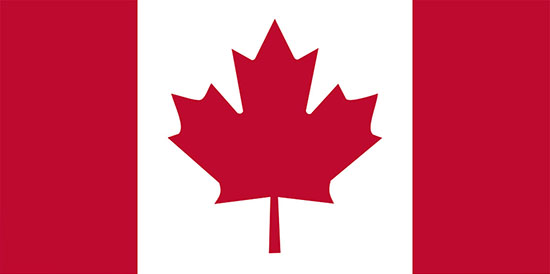
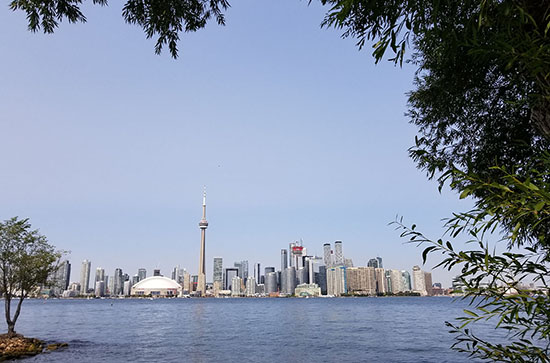
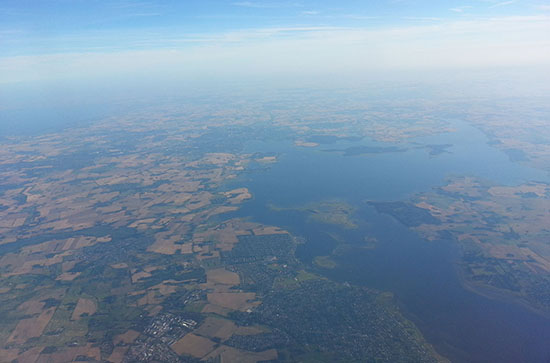
Multiple Ways to start your journey to become Canadian
- Visiting in Canada
- Studying in Canada
- Working in Canada
Visit Canada
It’s important to know what you are visiting for (business trip, visiting family and friends, or staying for a long time) and submit appropriate applications and documents. Depending on your country of origin, some visitors require a visitor visa, such as Tourist Visa or Parent/Grandparent Super Visa, and some others require an Electronic Travel Authorization (eTA).
Study Permit
Canadian education is enriched with multicultural and multinational diversity that students from all around the world brings to the classrooms. The Canadian government sees the students as strong potential permanent residents.
You will have opportunities to work and apply for Permanent Residence. There are multiple ways to start your journey to become Canadian through the Canadian academic systems: Student visa, Post-Grad Student Work Permit, Spousal Study/Work Permit, and Canadian Experience Class.
Talk to us for more information and detail!
The Best CANADA Immigration Solution - PR IMMIGRATION CANADA
LMIA, Work Permit
Labour Market Impact Assessment (LMIA), Work Permit, Post-Graduation Work Permit (PGWP), Co-op/Internship Work Permit
Talk to us for more information and detail!
The Best CANADA Immigration Solution - PR IMMIGRATION CANADA

LMIA, Work Permit
Labour Market Impact Assessment (LMIA), Work Permit
An LMIA is a form of labour market verification designed to protect Canada’s domestic job marketplace, as well as protect foreign workers employed in Canada temporarily. Only under select circumstances can LMIA-exempt work permits be obtained.
The employer who wants to hire you must complete certain steps. For hiring a temporary worker, most employers need an LMIA before they can hire a temporary foreign worker. The employer must shows that there is a need for a temporary foreign worker and no Canadians or permanent residents are available to do the job. The LMIA application process depends on the type of program you’re hiring through.
Once an LMIA has been issued, you should provide a copy of the confirmation letter to each temporary foreign worker and tell each of them to apply for a work permit.
An employer-specific work permit allows you to work according to the conditions on your work permit, which include: the name of the employer you can work for, how long you can work, and the location where you can work.
If you want to bring your family with you, your spouse or common-law partner and dependent children may be able to work, study or live with you while you work in Canada.

PGWP, CO-OP Work Permit, Working Holiday VISA
Post-Graduation Work Permit (PGWP), Co-op/Internship Work Permit
The Post-Graduation Work Permit (PGWP) allows students who have graduated from eligible Canadian designated learning institutions to obtain an open work permit to gain valuable Canadian work experience.
Students who have completed their program of study are allowed to work while they are waiting for a decision on their post-graduation work permit application.
The "applicants" are or were holders of a valid study permit at the time of the post-graduation work permit application. The applicant must have been a full-time student enrolled at a DLI in a post-secondary academic program.
Skilled Canadian work experience in National Occupational Classification (NOC) skill type 0 or skill level A or B that is gained through the PGWP helps graduates qualify for permanent residence in Canada through the Canadian experience class within Express Entry.
CO-OP Work Permit
Some study programs include work experience as part of their curriculum. You can apply for a co-op or intern work permit if: you have a valid study permit, work is required to complete your study program in Canada, and you have a letter from your school that confirms all students in your program need to complete work placements to get their degree.
Working Holiday VISA
For obtaining a Working Holiday Visa, your age has to be between 18 and 30 on the day you apply the program. You are a citizen of a country which has signed an agreement with Canada. You have to hold a passport from an eligible country which is valid for the duration of the stay. You must not have participated in the International Experience Canada (IEC) in the Working Holiday category before.

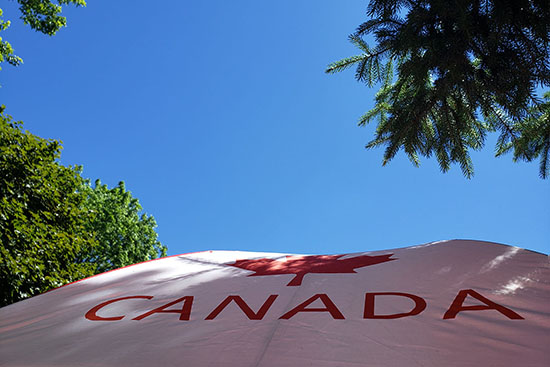
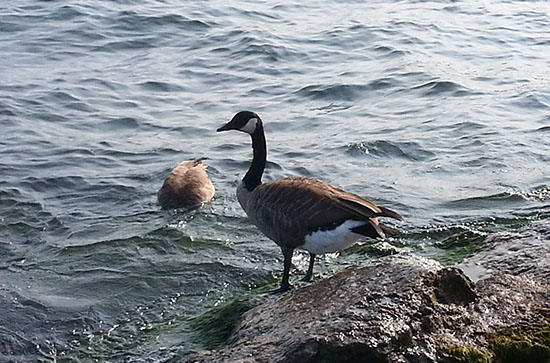
Express Entry (EE)
to start your journey to become Canadian
- Federal Skilled Worker (FSW)
- Canadian Experience Class (CEC)
- Federal Skilled Trades (FST)
Federal Skilled Worker (FSW)
This program is for skilled workers with foreign work experience who want to immigrate to Canada permanently. Skilled work experience means that you’ve worked in 1 of the following categories; Managerial jobs (skill type 0), Professional jobs (skill level A), Technical jobs and skilled trades (skill level B). You have at least one year of continuous paid work within the last 10 years.
Canadian Experience Class (CEC)
The Canadian Experience Class is for skilled workers who have Canadian work experience and want to become permanent residents. You must have at least one year of skilled work experience in Canada, in the last 3 years before you apply. Your work experience can be in one or more NOC 0, A or B jobs and You must meet the required language levels.
Federal Skilled Trades (FST)
The Federal Skilled Trades Program is for skilled workers who want to become permanent residents based on being qualified in a skilled trade. You must meet the job requirements for that skilled trade as set out in the National Occupational Classification, and have at least 2 years of full-time work experience in a skilled trade within the 5 years before you apply. Also, you have to meet the minimum score of Canadian Language Benchmark 5 for speaking and listening, and Canadian Language Benchmark 4 for reading and writing.
Talk to us for more information and detail!
The Best CANADA Immigration Solution - PR IMMIGRATION CANADA
Provincial Nominee Program (PNP), AIP, RNIP, In-Demand
Each province and territory has its own “streams” (immigration programs) and requirements
Atlantic Immigration Program (AIP), Rural and Northern Immigration Pilot (RNIP), In-Demand Skills Stream
Talk to us for more information and detail!
The Best CANADA Immigration Solution - PR IMMIGRATION CANADA

Provincial Nominee Program (PNP)
Each province and territory has its own “streams” (immigration programs) and requirements
This program is for workers who: has the skills, education and work experience to contribute to the economy of a specific province or territory, wants to live in that province, and wants to become permanent residents of Canada.
Provinces and territories may target: students, business people, skilled workers, semi-skilled workers. You must follow the instructions on their website and the criteria by province and territory vary and can change without notice.
As part of the process, you will have to pass a medical exam and get a police check (certificate). Everyone must have these checks, no matter where they plan to live in Canada.
Alberta Immigrant Nominee Program (AINP)
BC Provincial Nominee Program (BC PNP)
Manitoba Provincial Nominee Program (MPNP)
New Brunswick Provincial Nominee Program (NBPNP)
Newfoundland and Labrador Provincial Nominee Program (NLPNP)
Northwest Territories Nominee Program (NTNP)
Nova Scotia Nominee Program (NSNP)
Ontario Immigrant Nominee Program (OINP)
Prince Edward Island Provincial Nominee Program (PEI PNP)
Saskatchewan Immigrant Nominee Program (SINP)
Yukon Nominee Program (YNP)

AIP, RNIP, In-Demand Skills Stream
Atlantic Immigration Program (AIP), Rural and Northern Immigration Pilot (RNIP), In-Demand Skills Stream
Atlantic Immigration Program (AIP)
The Atlantic Immigration Program is a pathway to permanent residence for skilled foreign workers and international graduates from a Canadian institution who want to work and live in 1 of Canada’s 4 Atlantic provinces—New Brunswick, Nova Scotia, Prince Edward Island or Newfoundland and Labrador. The program helps employers hire qualified candidates for jobs they haven’t been able to fill locally.
Rural and Northern Immigration Pilot (RNIP)
The Rural and Northern Immigration Pilot is a community-driven program. It’s designed to spread the benefits of economic immigration to smaller communities by creating a path to permanent residence for skilled foreign workers who want to work and live in one of the participating communities.
Ontario (North Bay, Sudbury, Timmins, Sault Ste. Marie, Thunder Bay)
Manitoba (Brandon, Altona/Rhineland), Saskatchewan (Moose Jaw), Alberta (Claresholm)
British Columbia (Vernon, West Kootenay (Trail, Castlegar, Rossland, Nelson))
In-Demand Skills Stream
The Employer Job Offer: In-Demand Skills stream gives foreign workers with a job offer in specific in-demand occupations such as in agriculture, construction, trucking, personal support work, and other select occupations the opportunity to apply to permanently live and work in Ontario.



Family Sponsorship
- Sponsor your Spouse, Partner
- Sponsor your Dependent Children
- Sponsor your Parents and Grandparents
Canada has sought to welcome immigrants to strengthen its economy, bring families together, and on humanitarian and compassionate grounds. The family class is the second largest category of newcomers welcomed by Canada under its Immigration Levels Plan. Your relatives can live, study and work in Canada if they become permanent residents of Canada. You can sponsor certain relatives to come to Canada. You must at least 18 years old and a Canadian citizen or permanent resident of Canada.
Sponsor your Spouse, Partner
Someone who you are legally married to in either Canada or in another country and are compliant with the law of the country where the marriage took place. Under Canadian law, this can also extend to a same-sex spouse.
There are three (3) types of relationship defined for partner in partner sponsorship such as Spouse, Common-law Partner, and Conjugal Partner.
Sponsor your Dependent Children
Government of Canada puts importance to having family united. Permanent residents and citizens of Canada is allowed to sponsor their dependent children; the children of their spouse/partner; or children that are adopted, as long as they meet the requirements as laid out by the government and are proven to still be dependent on the parental sponsor.
Sponsor your Parents and Grandparents
Government of Canada puts importance to having family united. Permanent residents and citizens of Canada is allowed to sponsor their parents or grandparents as long as they can prove their relationship and meet the requirements as laid out by the government.
Talk to us for more information and detail!
The Best CANADA Immigration Solution - PR IMMIGRATION CANADA
Rehabilitation, Rejected Case Appeal
Rehabilitation, Rejected Cas Appeal, Refugee Claim, PR Card, Citizenship Application
Talk to us for more information and detail!
The Best CANADA Immigration Solution - PR IMMIGRATION CANADA

Rehabilitation
Rehabilitation for Persons Who Are Inadmissible to Canada Because of Past Criminal Activity
Applicants applying for permanent residence are considered to be criminally inadmissible if the person was convicted of an offence in Canada or outside of Canada that is considered a crime in Canada; or committed an act outside of Canada that is considered a crime under the laws of the country where it occurred and would be punishable under Canadian law.
You can apply for rehabilitation if: you committed a crime outside Canada over five years ago or you were convicted of a crime outside Canada and your sentence ended at least five years ago.

Rejected Case Appeal
IAD hears appeals on immigration matters such as refused sponsorship and removal orders
If you were denied a Canada visa you can send in an appeal letter for the government to reassess your case. The Immigration Appeal Division (IAD) is part of the IRB (Immigration and Refugee Board), an independent tribunal that was created to oversee immigration matters.
There is no formal appeal process if your application for a temporary resident visa is refused. Should you wish to re-apply, you should do so only if your situation has changed substantively or you have significant new information to submit.
Sponsorship appeals
Removal order appeals
Residency obligation appeals
Refugee Claim, PR Card, Citizenship Application
Refugee Claim, PR Card, Citizenship Application
Talk to us for more information and detail!
The Best CANADA Immigration Solution - PR IMMIGRATION CANADA
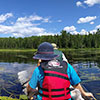
Refugee Claim
Claim refugee protection from inside Canada
Canada offers refugee protection to some people in Canada who fear persecution or who would be in danger if they had to leave. Some dangers they may face include torture, risk to their life, risk of cruel and unusual treatment or punishment. If you feel you could face one of these risks if you go back to your home country or the country where you normally live, you may be able to seek protection in Canada as a refugee.

PR Card, Citizenship
PR Card Renew, Citizenship Application
PR Card RenewIf you want to leave Canada: renew your PR card before you leave. You need a valid PR card to return to Canada by plane, train, bus or boat. If you’re outside Canada, apply for a Permanent Resident Travel Document (PRTD) to return to Canada.
Citizenship Application
Applicants must be a permanent resident, have lived in Canada for at least 3 out of the last 5 years (1,095 days), have filed your taxes. if you need to pass a citizenship test, prove your language skills in English or French.
